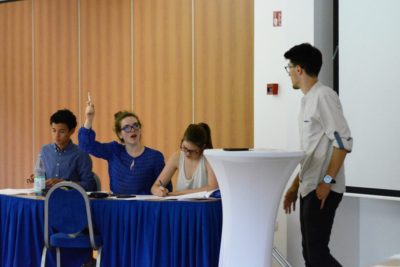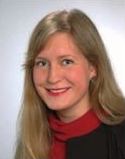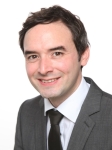This month: World Schools Debating Championships in Stuttgart
In addition to debating at universities, competition has spread at schools all over the globe in recent decades. For example, participating countries annually send a delegation of pupils aged 14 to 19 to the World Schools Debating Championships (WSDC), which are comparable to the World Universities Debating Championships. Laura Alviz of the Debating Society Germany e.V. explains what exactly that means. WSDC takes place in Stuttgart next week.
After the German team had to cover long distances in 2014 and 2015 to reach the Southeast Asian cities Bangkok and Singapore, traveling becomes easier this year. WSDC takes place in seven days right in Stuttgart.
In 1988, WSDC was held for the first time. Each country may send a team of three to five speakers who are being accompanied by coaches, team managers and judges. Almost thirty years ago, the movement was still limited to six nations. Over the decades, WSDC did not only expand numerically, but also in terms of cultural diversity. In Stuttgart, 56 groups of countries from all continents or more than 500 individuals will be guests. Rwanda and Switzerland give their World Cup debut in the Baden-Württemberg state capital.

The current Team Germany during a debate at the World Schools Debating Academy in Kranjska Gora, Slowenien. © Anastazija Stupar
In World Schools Debating, unlike in the British Parliamentary format, only two teams compete against each other in a debate. Proposition and Opposition both consist of three speakers with each of them giving an eight-minute speech. In the end, either the first or second speaker summarizes the debate from their side’s perspective. It is also noteworthy that out of eight preliminary rounds, four are prepared and four impromptu debates. This distinction exists to facilitate discussions that require research due to their complexity. At least two months before the tournament, the prepared motions have to be released. On July 21st, 22nd, 24th and 25th, the youngsters will debate about the moral responsibility to donate, referenda prior to the ratification of free trade agreements, patents in the technology industry and President Obama’s foreign policy. Impromptu debates in World Schools Debating also require somewhat less ability to improvise than they do in university debating. Students prepare their arguments in an hour, rather than in 15 minutes. Judges evaluate their performance according to the categories style, content and strategy.

Jana Gilke is one of the two conveners. © Foto Janke
The World Schools Debating Championships in Stuttgart start on July 19th and end on July 29th. Although the guests are accommodated in the state capital, the competition encompasses the entire metropolitan area. Schools in Esslingen, Schwäbisch Gmünd or Backnang, just to name a few, have declared their willingness to act as venues for debates. One of the goals of that is to create more awareness for World Schools Debating in Germany. Additionally, schools that are already familiar with the format may be motivated to participate in tournaments outside of Germany and encourage debaters to to apply for the national team.
The Debating Society Germany e.V., an association founded in 1996 and based in Stuttgart, is responsible for the organization of the event. It administers debating leagues and tournaments in Germany as well as the annual international tournament EurOpen in Stuttgart and also sends delegations abroad.

Christopher Sanchez is convenor, too. © Photo Planet Stuttgart
Under the leadership of Christopher Sanchez and Jana Gilke, the chairpersons of the association, teachers, students and other volunteers work on WSDC. Christopher teaches at the Max-Born-Gymnasium in Backnang, Jana attends the University of Mannheim and is active in schools and university debating. Approximately 80 German students on from eighth grade have volunteered to support the work of the organizing committee. They lead the teams and judges to the venues and are available to answer questions.
The German team has never made it further than the preliminary rounds in the Word Schools Debating Championships. In 2014, the team reached the 17th and in 2015 the 18th place, which means that they just missed the knockout phase. However, Joke Steinwart (17), Barbara Krumpholz (17), Judith Benk (17), Clíodhna Herkommer (16) and Marcus Nonn (15), who are going to be representing Germany next week, want to break to the Octofinals.
For more information about the World Schools Debating Championships 2016 in Stuttgart, visit www.wsdcgermany2016.com. All debates are free of charge and open to the public. The Achte Minute will report from the tournament on the magazine’s German version.
Laura Alviz/lok.
Laura Alviz (18) is press officer of the World Schools Debating Championships 2016 in Stuttgart. She has been involved in World Schools Debating for four years as a speaker, trainer, judge and organizer. She started debating as an extracurricular activity at the Max-Born-Gymnasium in Backnang. Besides working in the organization team of the tournament, she assists Elizabeth Baines (19) in coaching the German national team. Both represented Germany at WSDC in Singapore last year.
Das Mittwochs-Feature: Every Wednesday at 10.00 a.m. the Mittwochs-Feature features some idea, interview or book regarding debate – usually in German, sometimes in English, sometimes both. If you would like to start a debate please mail us your idea to team [at] achteminute [dot] de.






